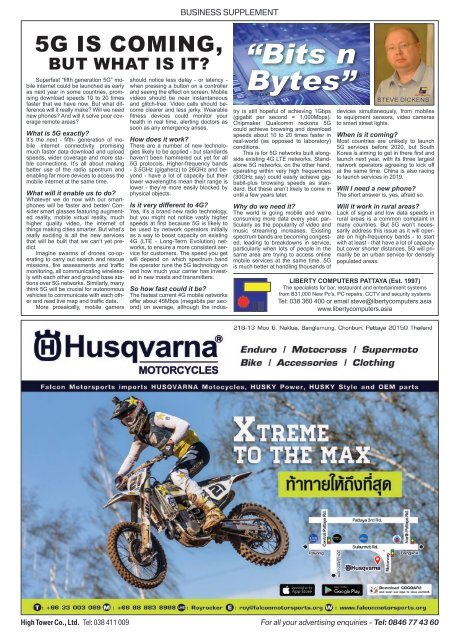PBS AUG1
You also want an ePaper? Increase the reach of your titles
YUMPU automatically turns print PDFs into web optimized ePapers that Google loves.
BUSINESS SUPPLEMENT<br />
5G IS COMING,<br />
BUT WHAT IS IT?<br />
Superfast “fifth generation 5G” mobile<br />
internet could be launched as early<br />
as next year in some countries, promising<br />
download speeds 10 to 20 times<br />
faster that we have now. But what difference<br />
will it really make? Will we need<br />
new phones? And will it solve poor coverage<br />
remote areas?<br />
What is 5G exactly?<br />
It’s the next - fifth- generation of mobile<br />
internet connectivity promising<br />
much faster data download and upload<br />
speeds, wider coverage and more stable<br />
connections. It’s all about making<br />
better use of the radio spectrum and<br />
enabling far more devices to access the<br />
mobile internet at the same time.<br />
What will it enable us to do?<br />
Whatever we do now with our smartphones<br />
will be faster and better/ Consider<br />
smart glasses featuring augmented<br />
reality, mobile virtual reality, much<br />
higher quality video, the internet of<br />
things making cities smarter. But what’s<br />
really exciting is all the new services<br />
that will be built that we can’t yet predict.<br />
Imagine swarms of drones co-operating<br />
to carry out search and rescue<br />
missions, fire assessments and traffic<br />
monitoring, all communicating wirelessly<br />
with each other and ground base stations<br />
over 5G networks. Similarly, many<br />
think 5G will be crucial for autonomous<br />
vehicles to communicate with each other<br />
and read live map and traffic data.<br />
More prosaically, mobile gamers<br />
should notice less delay - or latency -<br />
when pressing a button on a controller<br />
and seeing the effect on screen. Mobile<br />
videos should be near instantaneous<br />
and glitch-free. Video calls should become<br />
clearer and less jerky. Wearable<br />
fitness devices could monitor your<br />
health in real time, alerting doctors as<br />
soon as any emergency arises.<br />
How does it work?<br />
There are a number of new technologies<br />
likely to be applied - but standards<br />
haven’t been hammered out yet for all<br />
5G protocols. Higher-frequency bands<br />
- 3.5GHz (gigaherz) to 26GHz and beyond<br />
- have a lot of capacity but their<br />
lower wavelengths mean their range is<br />
lower - they’re more easily blocked by<br />
physical objects.<br />
Is it very different to 4G?<br />
Yes, it’s a brand new radio technology,<br />
but you might not notice vastly higher<br />
speeds at first because 5G is likely to<br />
be used by network operators initially<br />
as a way to boost capacity on existing<br />
4G (LTE - Long-Term Evolution) networks,<br />
to ensure a more consistent service<br />
for customers. The speed you get<br />
will depend on which spectrum band<br />
the operator runs the 5G technology on<br />
and how much your carrier has invested<br />
in new masts and transmitters.<br />
“Bits n<br />
Bytes”<br />
So how fast could it be?<br />
The fastest current 4G mobile networks<br />
offer about 45Mbps (megabits per second)<br />
on average, although the industry<br />
is still hopeful of achieving 1Gbps<br />
(gigabit per second = 1,000Mbps).<br />
Chipmaker Qualcomm reckons 5G<br />
could achieve browsing and download<br />
speeds about 10 to 20 times faster in<br />
real-world (as opposed to laboratory)<br />
conditions.<br />
This is for 5G networks built alongside<br />
existing 4G LTE networks. Standalone<br />
5G networks, on the other hand,<br />
operating within very high frequencies<br />
(30GHz say) could easily achieve gigbabit-plus<br />
browsing speeds as standard.<br />
But these aren’t likely to come in<br />
until a few years later.<br />
Why do we need it?<br />
The world is going mobile and we’re<br />
consuming more data every year, particularly<br />
as the popularity of video and<br />
music streaming increases. Existing<br />
spectrum bands are becoming congested,<br />
leading to breakdowns in service,<br />
particularly when lots of people in the<br />
same area are trying to access online<br />
mobile services at the same time. 5G<br />
is much better at handling thousands of<br />
STEVE DICKENS<br />
devices simultaneously, from mobiles<br />
to equipment sensors, video cameras<br />
to smart street lights.<br />
When is it coming?<br />
Most countries are unlikely to launch<br />
5G services before 2020, but South<br />
Korea is aiming to get in there first and<br />
launch next year, with its three largest<br />
network operators agreeing to kick off<br />
at the same time. China is also racing<br />
to launch services in 2019.<br />
Will I need a new phone?<br />
The short answer is, yes, afraid so.<br />
Will it work in rural areas?<br />
Lack of signal and low data speeds in<br />
rural areas is a common complaint in<br />
many countries. But 5G won’t necessarily<br />
address this issue as it will operate<br />
on high-frequency bands - to start<br />
with at least - that have a lot of capacity<br />
but cover shorter distances. 5G will primarily<br />
be an urban service for densely<br />
populated areas.<br />
LIBERTY COMPUTERS PATTAYA (Est. 1997)<br />
The specialists for bar, restaurant and entertainment systems<br />
from B31,000 New Pc’s, PC repairs, CCTV and security systems<br />
Tel: 038 360 400 or email steve@libertycomputers.asia<br />
www.libertycomputers.asia<br />
High Tower Co., Ltd. Tel: 038 411 009<br />
For all your advertising enquiries - Tel: 0846 77 43 60

















